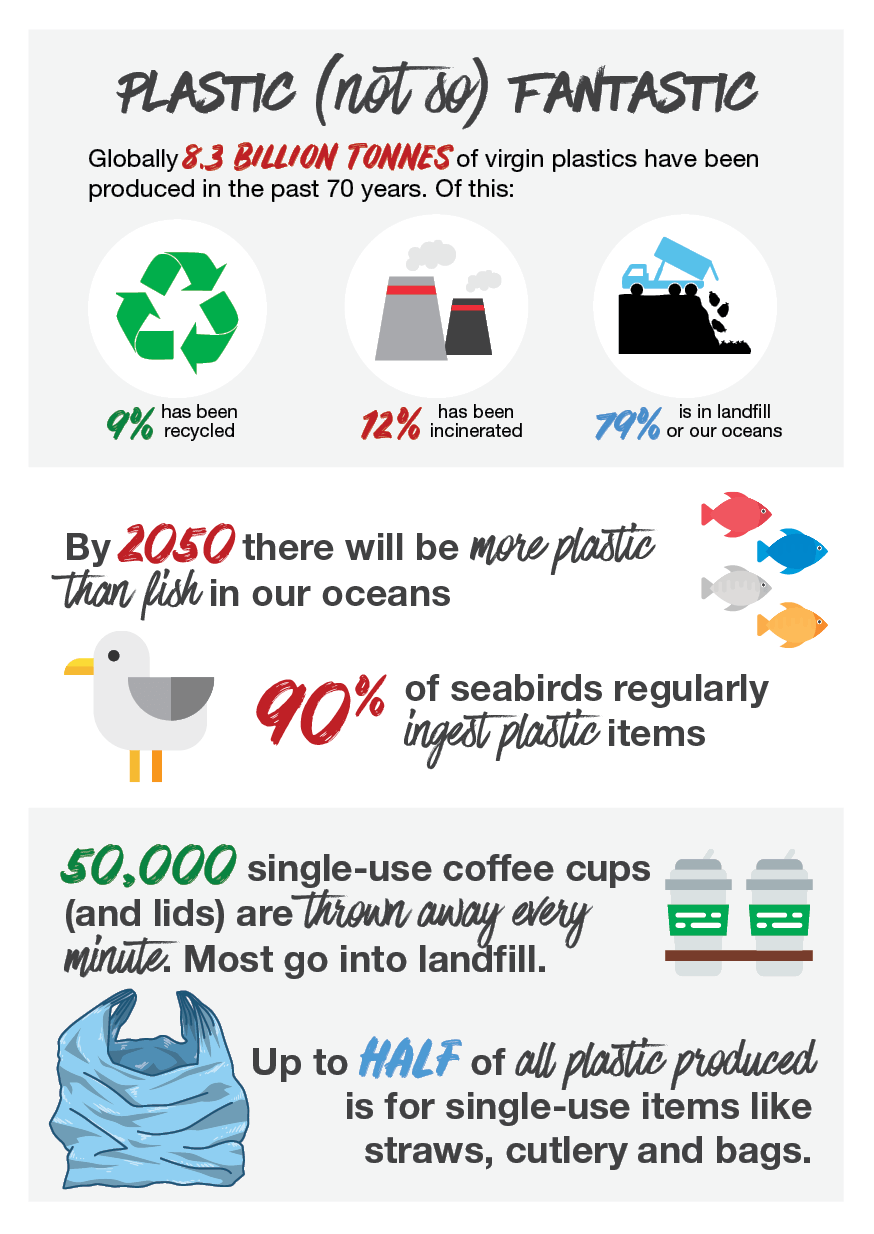By Kal Glanznig
We are constantly exposed to grotesque images of marine animals with stomachs full of plastic, repeated facts that there will be more plastic in the ocean than fish by 2050 and beaches and rivers lined with plastic bottles. It seems that the large wicked problem of plastic pollution is unsolvable by individual action. This view is anything but the truth!
Over the last few years in particular, both global and local action has been making huge strides to solving the global issue of ocean plastic and plastic pollution.

Plastic is entrenched in our lives, being found in nearly all items in our daily lives; our phones, clothing and even our body washes. It is an extremely effective material due to its long lasting nature. However, the problem we face with plastic - as for example plastic bottles, is that it takes 450 years to break down (Source WWF).
The main problem isn’t with plastic itself but with the use and disposal of it. As more and more nations have developed and gained access to the plastic products that we have established, waste disposal systems for many nations (particularly in the South East Asian regions) have been unable to combat the increase in waste or are unable to educate the public. Instead, they have resorted to disposing of the waste into their river ecosystem which feeds into the ocean.

Majority of ocean plastic comes from rivers and over 80% of river plastic comes from just 1000 rivers, mostly located in SouthEast Asia. One company has started to tackle this, The Ocean Cleanup; founded to clean a large cluster of ocean trash called the Great Pacific Garbage Patch. The Ocean Cleanup has created a system to clean these rivers called the Interceptor which can remove 50,000kg of waste a day.
Not only are there global solutions being used to curb the impact of plastic pollution but local solutions have been developed as well. Here in NSW, the State Government introduced a Return & Earn scheme in December 2017 to reduce drink container litter which in 2014/15 represented about 44% of all litter in NSW - a staggering 160 million littered drink containers (Source NSW EPA). Since the introduction of the Return & Earn scheme, which gives participants 10c per container recycled at a deposit, 2 billion containers have been recycled through the program. 2 billion containers which would have ended up in landfill or littered in the environment. The community response and collective actions of individuals truly has made a difference.
This ‘War On Waste’ community movement to tackle the plastic problem has led to various communities banding together to try to make their area ‘Plastic Free’. Beginning with Noosa, QLD in 2018 similar initiatives have sprung up across Australia. Plastic Free Noosa has been highly successful, contributing to removing 3 million pieces of plastic from its member businesses and showing to other areas that it benefits businesses to transition to non-plastic alternatives.

Inspired by the impact and success of these plastic-reduction initiatives across Australia, I helped create Plastic Free Cronulla alongside the Cronulla Chamber of Commerce in order to help local businesses reduce their plastic usage. The exciting thing I’ve learnt from my time with the Plastic Free Cronulla initiative is that many businesses in the Sutherland Shire have already begun transitioning to plastic alternatives such as bamboo cutlery and paper bags or are actively looking to. We have helped numerous businesses find solutions to reducing their plastic usage and we hope that the promotion, support and resources we provide can help streamline the inevitable transition.


For businesses in the local area that have reduced their plastic usage through our support or who have already eliminated the most common polluting items of plastic straws, plastic bags, plastic cups, takeaway containers and plastic cutlery we accredit them as either a ‘Plastic Free Champion’ or a ‘Plastic Free Warrior’. We also promote their efforts to the broader community through our own social media channels (@Plasticfreecronulla) and through our media partners Shire Talk and The Leader.

We are also partnering with events to help make them plastic-free. Last year we partnered with the Cronulla Spring Festival, the largest community event in the Sutherland Shire that has roughly 50,000 attendees, to make it plastic-free. All stallholders weren’t allowed to use plastic straws, cutlery, cups, plastic bags or take away containers. It was great to see that about 120 of the 140 stalls went plastic-free as you aren't going to get all of the stallholders to transition to being plastic-free straight away.
Globally and locally there is still a long way to go, it is a multifaceted problem but dealt with collectively on both a community and individual level it can be solved. Unlike other global environmental problems, the issue of ocean plastics and plastic pollution can be tackled by the smallest of changes. Our saying at Plastic Free Cronulla is ‘every little bit counts’, every plastic straw you don’t use or bringing your own cup to get a coffee collectively can make a huge difference.
If you’re interested in learning more about plastic check out the following article:
If you’d like to know more about campaigns fighting plastic pollution check out these articles:
*The views and opinions expressed in this article are those of the author(s) and do not necessarily reflect the official position of the Woke magazine.
**Cover Image by Volodymyr Hryshchenko on Unsplash

Comments